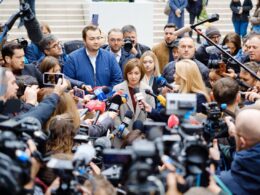One of the reasons for the success Vladimir Putin has had in his propaganda efforts is that he has exploited a dangerous trend in Western media – the proclivity of many journalists and their audiences to equate “balance” with “objectivity” – by putting out as an “alternative” viewpoint something that is nothing more than a lie.
In a comment for the “EU Observer” yesterday, Linas Linkevicius, Lithuania’s foreign minister, has sharply criticized this unfortunate pattern and its consequences and has pointed out that “a lie isn’t an alternative point of view;” it is simply a lie and needs to be identified as such.
Many in Europe and the West, Linkevicius writes, tend “to consider propaganda as an exotic bug which only affects the lives of people far away – in Ukraine, Georgia, [and] Russia. But carefully-packaged lies are finding their ways to audiences all over Europe,” as a result of “a systematic and heavily-funded campaign.”
“Saying that the West is immune because we have a plethora of media outlets isn’t true,” the Lithuanian diplomat continues.
At present, he continues, “large, Russian-speaking portions of the EU audience, whether in the Baltic states, or in London, get the Kremlin's view first and foremost. It's the result of language limitations or old media habits. In this sphere, media plurality means plural TV channels all manipulated by one (Russian) authority.”
The West’s experiences in “past gas crises involving the Russian gas supplier, Gazprom, should have taught us a lesson. There is no such thing as diversity of supply if all the routes lead to one source. And lack of diversity is a security threat.”
“We had the courage to confront Gazprom’s monopoly in Europe,” Linkevicius says. “Now it’s time to confront Russia’s infoprom, which has weaponized information in the same way the Kremlin weaponized energy supplies.”
That requires, the Lithuanian foreign minister argues, that “we need to start thinking not just ‘what can we do for them?’ referring to non-EU eastern European states, but also ‘what can we do to protect ourselves?’ … It’s equally important to ensure the transparency of funding and ownership of media outlets which operate in the EU.”
“Kremlin mouthpieces know how to register in our cities,” he continues. “They put on a "made in the EU" label, then they begin to quietly incite hatred, hoping no one will question what they're doing because of the holy cow of free speech.”
Some in Europe are waking up to this danger and beginning to speak out. British officials have declared that “’freedom of speech is not absolute.’” The European Commission has declared that “limiting freedom of expression can be a proportionate course of action … to protect the integrity of public information.” And the European Court of Human Rights has found that “freedom of speech is not a defense for defamation.”
Thus, Linkevicius says, “we should ensure there is a level playing field, and the same set of rules, for all of Europe’s media outlets. No one should be allowed to play rugby on a soccer pitch.”
Earlier this year, he writes, he and his counterparts from Denmark, Estonia and the United Kingdom called on the EU to “respond to Kremlin propaganda with a ‘4 As’ approach:
- ensure information Alternatives
- raise public Awareness
- be Assertive on proactive communication of facts
- request Accountability from media outlets.”
That has “nothing to do with censorship or with producing our own propaganda/lies,” he argues. Rather, it involves both providing alternative sources for Russian-language audiences and changing “our own thinking. We need to understand that [Russian] propaganda is directed against all of Europe, not just the east, and we need to start calling things by their proper names.”
“A [Russian] T-90 tank in Ukraine isn’t just a ‘vehicle,’” he concludes. “A lie is not an alternative point of view. [And] propaganda is not a legitimate form of public diplomacy.” Only “our naiveté is preventing us from taking appropriate action, even as the other side advances its undeclared info-war.”
Related:
- Putin has launched 'world war against trust,' Yakovenko says
- Putin's 'International of Lies' based on money, not ideas, Yakoveno says
- 15-point checklist of Putin regime's propaganda techniques
- Moscow's disinformation operation - far beyond mere lying and obfuscation
- A guide to Russian propaganda

![Linas Linkevicius: A [Russian] T-90 tank in Ukraine isn’t just a "vehicle". A lie is not an alternative point of view. Propaganda is not a legitimate form of public diplomacy. (Image: eu2013.lt)](https://euromaidanpress.com/wp-content/uploads/2015/09/b1b0ccb037ba242a8e825f211c3517ea-800x2.jpg)



